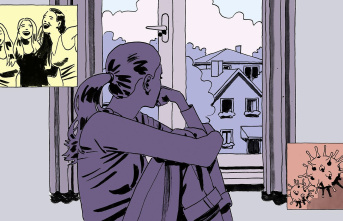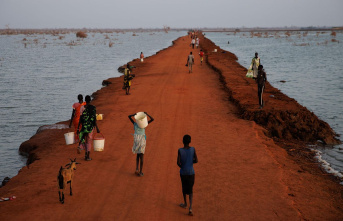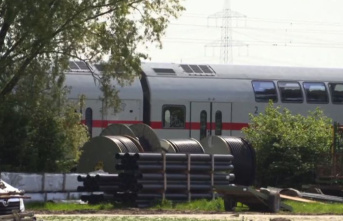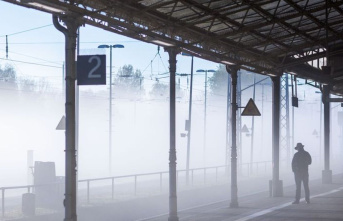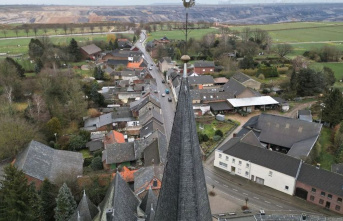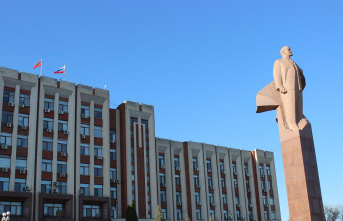Christmas in Putin's Russia does not have the festive character that it does in other parts of the world. And Orthodox Easter is celebrated by a very believing minority. The only time of the year when the whole country shows a special fervor together is on May 9, when the Soviet victory against Nazi Germany in World War II is commemorated.
The Russian president yesterday compared that historical fact with his current military campaign in Ukraine. "You are fighting for the motherland, so that no one forgets the lessons of the Great Patriotic War, so that there is no room in the world for executioners, repressors and Nazis," Putin said, addressing the Russian army and pro-Russian militiamen in Donbass during his speech. in Red Square, before the traditional military parade.
This annual parade is the culmination of Victory Day and a national identity that has its roots in Soviet times, but has been shaped in recent decades and has become much more than a religion in Russia today.
Vladimir Putin took advantage of the great celebration of Russian patriotism to justify the "special military operation" in Ukraine, as he himself called it when he sent the armed forces to the neighboring country on February 24.
The head of the Kremlin assured that NATO was carrying out a military deployment "near our borders". According to him, “preparing a punitive operation in Donbass, an invasion of our historical territories, including Crimea”, the Black Sea peninsula that Russia annexed in 2014 and that the Western community continues to consider an integral part of the territory of Ukraine.
According to the Russian president, he alluded to “an inevitable confrontation with the neo-Nazis of Bandera”, in reference to the followers of the Ukrainian collaborationist leader of Hitler's Germany Stepán Bandera.
May 9 became a national holiday in 1965, at the time of Leonid Brezhnev, to legitimize the Soviet system and underline the leadership of the Communist Party in the victory against Hitler in 1945.
In the absence of strong ideological foundations to support the current political system, Kremlin strategists found in Victory Day the essence of Russian patriotism and have gradually turned it into a kind of cult, where faith wins over reason. The fact that almost every family has ancestors who defended the country from the German invasion, or lost their lives (27 million Soviet citizens died), makes it easy for this date to have many followers. After the military parade, which was organized in 28 Russian cities, the march of the Immortal Regiment was also held yesterday, in which thousands of people attended with portraits of their relatives-heroes. In Moscow yesterday there were more than a million attendees, including Putin himself, who carried a photo of his father. Another million gathered in St. Petersburg.
This has made it possible to simplify the historical facts. It is not necessary, for example, to explain what ideology the Nazis had, or what led the Third Reich to go to war with almost all of Europe and carry out the Holocaust. The bottom line is that they attacked Russia, they attacked the Motherland.
In this sense, any event or explanation linked to this fact will be welcomed by public opinion. "Russian troops (in Ukraine) are completing the battle that our fathers, grandfathers and great-grandfathers waged against Nazism," Sergei Kirienko, deputy head of the Russian Presidential Administration, said on May 5 in a television address from recently captured Mariupol.
In 2015, then-Russian Culture Minister Vladimir Medinsky, who today heads the Russian delegation to the Ukraine peace talks, criticized historians who tried to prove that various Soviet myths about the war had been invented. “We must see them in the same way as the saints in the Church,” he stated.
With the praise of victory, negative events that occurred at other times in the 20th century lose part of their importance for Russian society. Despite the Great Terror or the Gulag, according to a 2019 Levada Center survey, 70% of Russians maintained that Joseph Stalin, who led the USSR during the war, did more good than harm for the country.
The idea of the victory of 1945 fits perfectly with one of the objectives that Putin has always had: to recover the influence that Moscow had during the cold war and that it lost with the disintegration of the Soviet Union in 1991.
From his lectern in Red Square, the Russian president assured that Russia is today "strong" and that is why it has not bowed to the demands of the United States and NATO. After the end of the USSR, the US opted for its exclusivity, turning the whole world into its satellite, Putin accused. "But we are another country," he assured.
Despite the differences in international relations, "Russia has always advocated the creation of an equal and indivisible security system," Putin said. The president specified that said system is vital for the entire world community before seeing 11,000 soldiers and 131 units of weapons and military equipment parade through the Red Square .
Last year, Moscow demanded security guarantees from NATO, which included refusing to expand eastward and incorporate former Soviet republics into its ranks, arguing that the alliance's enlargement constitutes a security danger for Russia.
Contacts between Moscow and Western countries did not come to fruition. NATO refused to listen, Putin said yesterday. According to him, the West had aggressive "other plans" against Russia. Without once mentioning Ukraine, he assured that the military campaign in the neighboring country "was a forced decision", taken by a "strong, sovereign and independent country". Russia had "preemptively pushed back the aggressor," he claimed.
4


